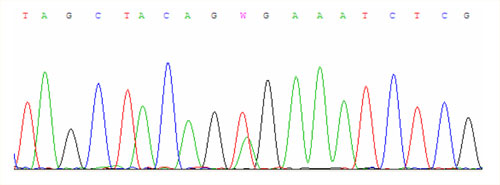The BRAF gene is localized in the chromosomal region 7q34 and is composed of 18 exons. The length of its transcribed mRNA is 2478bp. This gene encodes a protein belonging to the raf / mil serine / threonine kinases family. The protein plays an important role in the regulation of the MAPK/ERK signal cascade which influences a cell's division, differentiation and secretion.
The BRAF gene mutations are associated with a variety of tumors (colorectal carcinoma, malignant melanoma, non-Hodgkin's lymphoma, thyroid papillary carcinoma, small cell lung carcinoma and lung adenocarcinoma). 80 % of mutations are caused by a T1799A transversion which leads to an amino acid substitution V600E. Mutation V600E stimulates a phosphorylation on T599 and/or S602 in the activating domain of the BRAF protein and so confers a transformation activity to the cells. This causes that the BRAF protein remains permanently in its active state, regardless the RAS signalization.
Examination
We perform the examination of the part of exon 15 focusing on the detection of the codons V600, K601 mutation. We use PRC and reverse hybridization using BRAF 600/601 StripAssay (ViennaLab) kit.
Analytical sensitivity and specificity of the sequencing: 99%.
Limitations:
IIn the case of the analysis of somatic mutations the mutations will not be detected, if the altered cell line is not represented by at least 20% (sequencing), or 1% (reverse hybridization).



